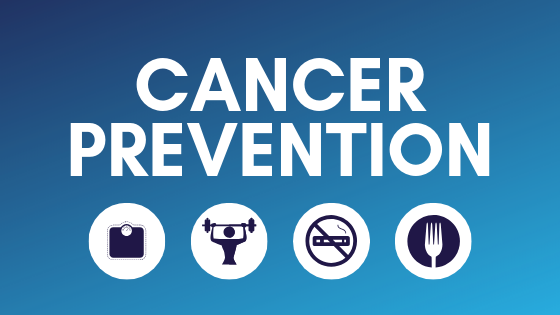Worried about cancer? Making a few lifestyle changes can help reduce your risk.
 Cancer Prevention
Cancer Prevention
While some cancer risk factors, such as age and family history, are beyond your control, there are some you can control. Lowering your risk of developing certain cancers may be as easy as making small lifestyle changes.
Environmental Exposures
According to the World Health Organization (WHO), nearly one fifth of all cancers are related to the environment or workplace carcinogens – a substance or exposure that causes cancer. They result in 1.3 million deaths per year, worldwide.
Some of the most common workplace exposure-related cancers are bladder cancer and lung cancer. One tenth of all lung cancer deaths may be caused by exposure to cancer causing materials, including asbestos, in the work environment.
In addition to those found in the workplace, there are other day-to-day environmental cancer causes you may encounter. Other cancer-causing exposures include the UV radiation in sunlight and water, soil and air pollution.
One type of air pollution is radon, a radioactive gas that occurs naturally from the breakdown of uranium in soil, rock, and water. Radon exposure is the number one cause of lung cancer among non-smokers and the second leading cause of lung cancer, overall. For those exposed to both radon and tobacco smoke, the risk of cancer increases nearly ten-fold.
Kentucky is rated by the EPA as a Zone 1 state, meaning it has the highest potential for radon exposure.
Lowering Your Risk
To reduce your risk of developing cancer from environmental causes, a good place to start is avoiding or limiting exposure.
For example, to lessen your cancer risk due to exposure to UV radiation, you can avoid sun lamps, tanning beds and take steps to protect your skin against the sun. To avoid cancers due to air pollution, watch for air quality alerts, keep your home well-ventilated and avoid smoking altogether or only smoke outside, away from doors and windows. In addition, test your home, office, and schools for radon to determine your exposure risk. If your radon level is above 4 pCi/L, contact a certified radon mitigation professional.
If you’re a business owner or manager and would like more information on making work safer for your employees, please contact Baptist Health Occupational Medicine. We provide a variety of health services, immunizations and education programs to help your employees stay healthy.


